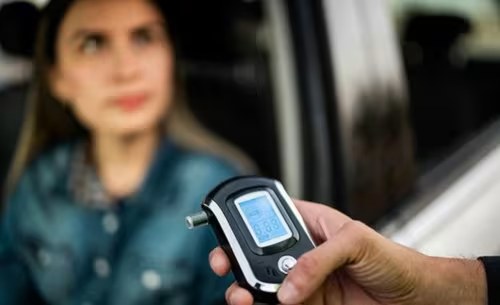Disclaimer: This guest post was written by a third party and is for informational purposes only. It does not constitute legal advice or create an attorney-client relationship with The Meehan Law Firm. For legal advice, please contact our office.
%20(1).webp)
%20(1).webp)
The Role of Field Sobriety Tests in DUI Enforcement
Field sobriety tests (FSTs) are typically conducted during a traffic stop when an officer suspects impairment. Field sobriety tests are called “divided attention” tests, since they are asking you to perform multiple things at once (similar to driving a vehicle where you must pay attention to more than one thing at the same time). These tests are designed to test for mental and physical impairment. The officer will tell you that these tests are designed to assist them in determining if you are safe to continue driving or if you are impaired by alcohol and/or drugs. These tests are conducted during the investigatory stage of the case.
It is important to understand that field sobriety tests are voluntary, so you can feel free to decline to participate in them. An officer must make a decision on whether or not to arrest someone for driving under the influence based on the evidence that they have gathered to that point. Field Sobriety Tests often give the officer additional evidence of impairment. If you do not perform these tests (which many cannot perform correctly without anything that could cause impairment in their system), then the officer will have less evidence.
Now, some may say, “well, if I pass them, then I can leave.” Yes, in theory, that is true, but the reality is, once the officer gets you out of the car to perform these tests, the officer intends to arrest you, and just wants more evidence to justify the arrest. The tests are not “pass/fail” but are tests that officer uses to look for clues indicating impairment. The more clues, the more likely you are impaired.
One field sobriety test the officer may ask a person to take is a Preliminary Alcohol Screening Test (a field breath machine), and you must understand that this test is also voluntary, since it cannot be substituted for a evidentiary breath test that would be offered after you are arrested for a DUI.
It is also important to note that FSTs are subjective to the officer’s interpretation of your performance, but your performance may also be impacted by the instructions that are given to you, if they are not clear. Poor performance on FSTs are not always reliable indicators of impairment and can be challenged in court based on various factors, such as the individual’s physical condition or environmental conditions at the time of the test.
California law recognizes several types of field sobriety tests established by the National Highway Traffic Safety Administration (NHTSA), designed to ensure uniformity in how officers evaluate impairment. There are three tests that the NHTSA has designated as “standardized field sobriety tests” (SFSTs) that if instructed properly and evaluated, a poor performance has a strong likelihood of indicating an impaired driver. These tests include the Horizontal Gaze Nystagmus (HGN), the Walk-and-Turn, and the One-Leg Stand.
- Horizontal Gaze Nystagmus (HGN) Test
In this test, the officer asks the driver to follow an object, usually a pen or flashlight, with their eyes. The officer looks for involuntary jerking movements of the eye, which can indicate alcohol impairment. If performed correctly, the officer will have the driver follow the object several times across the horizontal plane and then the vertical plane, and will look for different indicators of alcohol in your system (which you may have already admitted). - Walk-and-Turn Test
Here, an individual is instructed to take nine steps, heel to toe, along a straight line (may be imaginary), turn on one foot, and walk back in the same manner. Officers look for specific signs of impairment, such as losing balance, incorrect number of steps, raising arms for balance, not touching heel to toe, stepping off the line, improper turn, or failure to follow instructions. - One-Leg Stand Test
During this test, the driver is asked to stand with their hands at their side, and to raise one foot six inches off of the ground, and to count out loud in a particular way until told to stop. The officer looks for signs of impairment, such as swaying, using arms for balance, hopping, improper counting, or putting the foot down. Poor performance on this test may suggest to the officer that the driver is impaired, which could lead to further investigation.
These tests are not foolproof. Other factors like medical conditions, footwear, nervousness, uneven terrain, or poor weather conditions can affect performance. In addition, these tests are subjective, relying heavily on the officer's interpretation.
There are other Field Sobriety Tests that some officers use, that are not standardized by the NHSTA, but the officer uses them to determine impairment, or gather additional evidence. Because they are not standardized, the performance on them is often influenced by the instructions. The common non-standarized Field Sobriety Tests are:
1. Rhomberg: In this test, the officer will instruct you to stand with your hands at your side, close your eyes, tilt your head back, estimate thirty seconds, and then stop the test. The officer will look for swaying, raising your arms, how long it is that you take to estimate thirty seconds, eyes fluttering, and failing to follow instructions.
2. Finger to Nose Test: The officer will instruct you to stand with your hands at your side, and when told to do so, you will be told, “Right” or “Left” and whichever side is called out, you would take the finger from that hand and touch it to your nose. Officers are often very picky about where on your nose, your finger touches, so it is not a very good test for people to be successful at.
3. Alphabet test: This test is not standardized at all, and may take many forms. We have seen, a) recite the alphabet backwards; b) write the alphabet forward or backwards on a piece of paper; c) recite the alphabet from P to F (or some variation).
4. Hand-Pat: This non-standard FST requires the person to place one hand face up, and the other hand face down on that hand, then to flip it over and pat the back of your hand to the palm of the other, then flip it again to touch the palm to palm, and count 1, then do it again, until you reach a certain number. The officer will often look for you touching the side of one hand to the other.
5. Finger count. This non-standard FST is instructed that the person count pointer finger, middle finger; ring finger, pinkie finger, counting one, two, three, four, then count the same fingers backwards, counting backwards. The officer will generally tell the person to count faster (but not required). The officer may also criticize which part of your finger touched which part of the other finger.
Consequences of Refusing Field Sobriety Tests
Since FSTs are voluntary, refusing to take them does not result in legal penalties. Performing Field Sobriety Tests is really providing evidence against yourself, and if you recall your right to remain silent and not provide evidence against yourself, then refusing to perform these test makes sense. It Is important to keep in mind though that refusal may still influence the officer's decision to make an arrest if they suspect impairment based on other factors, such as driving behavior or physical appearance.
Once arrested, a driver is required by law to submit to a chemical test—either a breath or blood test—under the state's implied consent law. Refusing to take post-arrest chemical tests leads to severe consequences, such as automatic suspension of the driver's license for one year (or longer for repeat offenses), fines, and the refusal may be used as evidence against the driver in court. Additionally, a refusal could lead to enhanced penalties if the driver is convicted of DUI. It's important to understand that while refusing a field sobriety test carries no legal penalty, refusal of a chemical test after an arrest does. There are defenses to refusal to perform a chemical test following your arrest, but if that is unsuccessful, your driving privilege may be revoked for a year or longer.
Consequences of Poor Performance on Field Sobriety Tests
Although Field Sobriety Tests (FSTs) are voluntary in California, performing poorly on these tests can still have consequences. Officers typically rely on a combination of factors to make an arrest, including a driver’s behavior, physical appearance (such as slurred speech or bloodshot eyes), the smell of alcohol, or erratic driving. FSTs serve as an additional tool that can either strengthen or weaken the case for impairment. A poor performance on these tests can tip the scales toward an arrest for DUI, even though they are subjective and often influenced by other factors like nervousness, medical conditions, or environmental conditions at the time of testing. While FSTs are not always reliable indicators of impairment and can be challenged in court, a poor performance can be used to support the officer’s decision to arrest and may later be presented as evidence in court to suggest impairment. If they are captured on video, this evidence may help or hurt your case.
Role of Legal Defense
In California, a criminal defense attorney plays a critical role in challenging the validity and accuracy of Field Sobriety Tests (FSTs) administered during DUI stops. These tests, which are used to assess a driver's impairment, are often subjective and prone to errors. A skilled attorney can scrutinize the officer's conduct, the conditions under which the tests were given, and whether the driver had any medical or physical conditions that may have affected their performance. By highlighting procedural mistakes or improper administration of FSTs, a defense attorney can help reduce or dismiss DUI charges, ensuring that the rights of the accused are protected.
Conclusion
While police officers use field sobriety tests to assess a driver’s physical coordination and potential impairment, it is important to remember they are voluntary and generally do not benefit the driver. They are simply a means for the officer to collect more evidence of suspected impairment. Your attorney will look for problems in the administration of these tests, or possibly exclude them from evidence if there was no legal reason for the initial traffic stop.
(844) 4-DUI STOP
Categories
Need Help?
Free Consultation, discreet, and no obligation- talk to an attorney.
More Blogs

How Can You Defend Someone Who Is Guilty?
Defense attorneys protect constitutional rights, ensure due process...
Read More..
Why a Second DUI Might Be Your Wake-Up Call
Facing a Second DUI in California: Why It Should Be Your Wake-Up Call..
Read More..
How To Spot a Bad DUI Lawyer in 10 Minutes or Less
Choosing the Right DUI Lawyer in California: Spotting Red Flags Early...
Read More..



